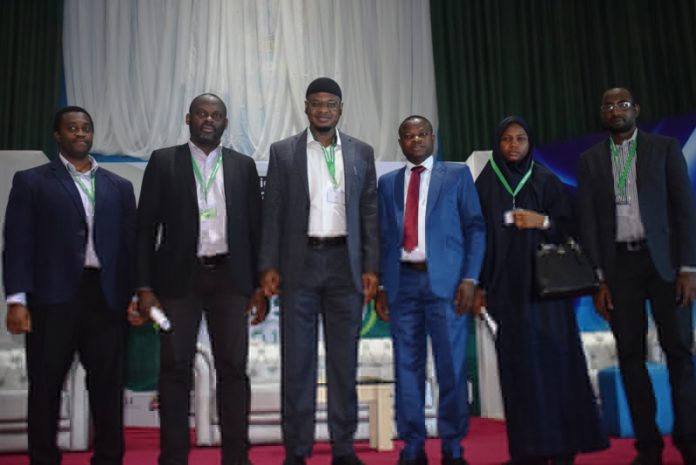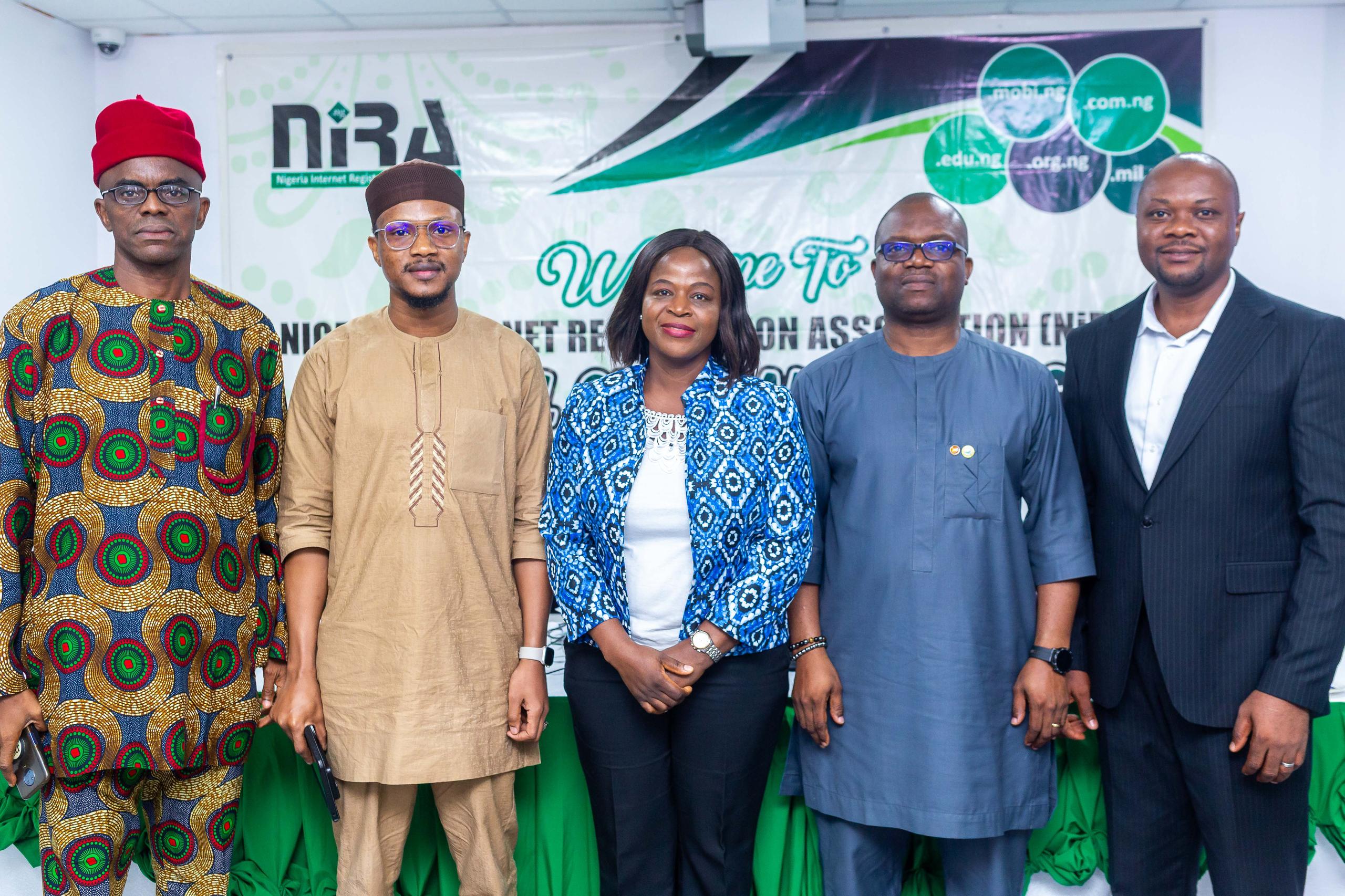Telecom
Usmanu Dan Fodio, UNILAG to Start Postgraduate Program on ICT Law

Dr. Isa Ali Ibrahim Pantami, Director General, National Information Technology Development Agency (NITDA) has said that the agency is collaborating with Usmanu Dan Fodio University, Sokoto and University of Lagos to introduce Postgraduate program in ICT Law for master’s degree and PhD levels.
He disclosed this to newsmen on Wednesday on the sidelines of the 27th National Conference of Nigeria Computer Society held at International Conference Center, University of Ibadan, Oyo State.
Pantami, noted that this has become necessary because all regulatory agencies require ICT lawyers to come and work for them.
He stated that the mandate of NITDA centers around two fundamental issues, IT development and regulation, adding that the two mandates require IT professionals and lawyers to develop and regulate the sector.
He said, “the agency in collaboration with other universities, like the university of Lagos and secondly Usmanu Dan Fodio University, sokoto, are introducing ICT law as a course for masters degree up to PhD level, because of the fact that we don’t have any course on ICT law in our universities and all regulatory agencies of ICT require ICT lawyers to come and work for them.
“The mandate of NITDA if you look at it critically centers around two fundamental issues, one IT development, two IT regulation.
“IT development, you always develop IT using IT professionals like computer scientist, computer engineers and many more, they are IT professional while you regulate the sector by deploying ICT lawyers, if you have ICT lawyers around then you can regulate the sector, so that is while we introduce ICT law as a course in our universities so that our country can produce many people that can regulate the sector and write many legal documents on behalf of the sector because we are to set standards, guideline and formulate policies for ICT adoption, deployment and usage all over the country.”
He equally stated that the agency activities is centered around digital inclusion with various programs of the agency at building local capacity, support startups and other businesses meet up with international standards.
This he said will boost inclusivity in technology value chain that can drive a formidable tech ecosystem for national economy growth development.
He explained that to this end the Agency has trained over 740 persons in digital technology and deployed 86 digital learning centers across the federation.
Pantimi disclosed that NITDA is running a four-year roadmap on Regulation, Capacity Building, Local Content Development, Digital Job Creation, E-Governance, Cyber Security, and Digital Inclusion.
NITDA’s vision, he said, is to be Nigeria’s prime Agency and catalyst for transforming Nigeria into a knowledge-based and IT-driven economy.
He said Strategic partnerships with leading institutions like NCS are necessary to ensure sustainable development in the sector.
He emphasized that a well-developed ICT sector will significantly improve any economy. It will reduce capital flight, create jobs, generate revenue and help to position Africa as a producer of world-class ICT products and not just consumer of such products.
Telecom
ARCON Probes 9mobile over Alleged N1Bn Advertising Debt

Advertising Regulatory Council of Nigeria (ARCON) is investigating a petition against 9Mobile, one of Nigeria’s top four telecoms companies, over an alleged N1 billion unpaid advertising debt.

In a statement issued at the weekend, the ARCON stated that the petition was filed by advertising agencies alleging that Emerging Markets Telecommunications Services Limited — trading as 9mobile — failed to settle payments for services rendered and has continued to engage new agencies without fulfilling existing obligations.
The regulator identified the alleged activity as a potential violation of the Nigerian advertising code, adding that it might have far-reaching consequences throughout the business.
“It was also alleged that while 9mobile refused to pay or resolve its indebtedness to the agencies, it has gone ahead to brief other agencies to continue its advertising and advertisement business with impunity,” the statement reads.
The ARCON said it would investigate whether 9mobile followed disengagement protocols when transitioning from the owed agencies to new ones and whether there were possible breaches of ethical procedures.
“Advertising debts are beyond agencies,” ARCON added.
“They belong mostly to media houses and third-party vendors/suppliers who are significantly affected by the indebtedness, with multiplier effects on their cash flow and operations.”
The council said it would partner with anti-graft and government agencies to ensure a full investigation and the debt’s resolution — stressing that the borders on economic sabotage.
The ARCON reiterated that the Nigerian advertising industry’s official payment threshold remains 45 days and promised to clamp down on practices that encourage unethical competition and unfair advantage.
“The council will take all necessary actions to eradicate unethical competition and ensure compliance with the Advertising Industry Standard of Practice (AISOP), including adherence to the 45-day credit policy,” it said.
9mobile is a member of the Advertisers Association of Nigeria (ADVAN), and its members are expected to follow advertising regulations and contractual duties within the ecosystem.
Telecom
NiRA Holds 17th AGM, Elects New Leadership to Propel .ng Domain Growth

Nigeria Internet Registration Association (NiRA) has successfully concluded its 17th Annual General Meeting (AGM), reinforcing its commitment to Nigeria’s digital identity.

(L–R): Ogbuefi Remmy Nweke, Member, Board of Trustees, NiRA; Mr. Ahmad Mukoshy, Newly Elected Executive Board Member, NiRA; Mrs. Seyi Onasanya, COO NiRA; Mr. Adesola Akinsanya, President, NiRA; and Mr. Peter Oluka, Executive Board Member, NiRA.
Held as a hybrid event at the NiRA Secretariat and virtually, the meeting brought together over 325 members, stakeholders, and media representatives to review progress and set future goals.
During the AGM, NiRA President, Mr. Adesola Akinsanya, emphasized the Association’s remarkable growth in 2024, including 94,723 new registrations and 61,227 renewals, bringing the total number of .ng domains under management to 212,890. The accreditation of 23 new registrars further strengthened NiRA’s reach and impact.
A major highlight was the implementation of DNS Security Extensions (DNSSEC), enhancing domain integrity and security. NiRA also launched a Registrar Incentive Programme in Q3 2024 to encourage adoption and reward top-performing registrars.
Strategic partnerships were a key focus, with collaborations across government and private sectors. NiRA continued its long-standing relationship with NITDA, engaged with the Nigeria Data Protection Commission (NDPC), and worked with the Lagos Chamber of Commerce and Industry to support businesses. Other partnerships included efforts with the Nigeria Computer Society and Innovation Support Network (ISN Hubs) to drive internet development in Nigeria.
Among NiRA’s recent initiatives were Tech Convergence 1.0, a flagship event exploring technology and creativity, and the 7th edition of the prestigious .ng Awards, recognizing individuals and organizations for their contributions to Nigeria’s digital ecosystem.
The Association also reaffirmed its commitment to Corporate Social Responsibility through the NiRA Kids Foundation (NKF) and .ng Academy, focusing on digital empowerment and capacity building.
The election of new Executive Board of Directors members marked a major step forward, with Mrs. Mary Olaseni, Mrs. Abibat Olatunji, and Mr. Ahmad Mukoshy joining the board, while Mr. Chukwuemeka Fred Agbata and Mr. Destiny Amana assumed new roles. The outgoing board members were recognized for their service and contributions.
The seamless execution of the AGM underscored NiRA’s professionalism and dedication. Moving forward, NiRA remains committed to fostering a secure and resilient digital ecosystem through the .ng domain, positioning Nigeria as a global digital leader.
Telecom
Glo, Huawei, Communications Ministry Bring Digital Services to Abuja Village

Telecommunications and digital services provider, Globacom, has partnered with the Federal Ministry of Communications, Innovation and Digital Economy and Huawei Nigerian Enterprises, to provide digital access to 7,000 remote communities in Nigeria with the commissioning of the pilot project in Isuanin Kura in Ibwa 2, Gwagwalada, on the outskirts of the Federal Capital Territory, Abuja on Wednesday.

The project, which is championed by the Ministry, will deliver 2G/3G/4G services, free public Wi-Fi access, digital healthcare and remote learning capabilities to the over 12,000 residents of the community.
Minister of Communications, Innovation and Digital Economy, Dr. Bosun Tijani, was full of commendation to Globacom and Huawei for supporting President Bola Tinubu’s commitment to addressing the connectivity crisis affecting more than 20 million Nigerians who currently lack basic telecommunication access in the country.
Said he: “If you bring out your phone in many communities, there is no network at all. This is costing the country significantly because people cannot access financial services, medical care, or education”, adding that this also poses governance challenges as disconnected areas are difficult to administer.
“Where you live should not determine your access to opportunity. We are using innovation to ensure every Nigerian, regardless of location, can thrive in the digital age”, the Minister added.
Globacom’s Group Chief Technical Director, Mr. Sanjib Roy, who spoke on the project said the company worked with the Ministry and Huawei to bring up the site by providing the Microwave backhaul link and access to Globacom’s full core network resources and also manage the operation of the site to ensure uninterrupted voice and data services for the community.
“The Smart Education facility allows for young students within the community to receive education remotely, with the teachers being in Abuja or any other part of the world, while Healthcare delivery has been revolutionised through connected medical equipment that enables remote consultations between patients in Ibwa and doctors and specialists in urban-locations”, Mr Roy explained. The site and all the equipment are powered by solar thereby ensuring clean environment and uninterrupted power supply.
During the inauguration, the system’s effectiveness was demonstrated with the leader of Isuanin Kura, Ibwa 2 Community, Chief Abubakar Bamaiyi, having a live consultation with a medical doctor in Abuja, while the Minister and other guests watched as the students in the local school were being taught via online video by a teacher in Lagos, using equipment provided by Huawei.
Mr Kazeem Kaka, Globacom’s Head of Division, North West, who also spoke at event, said, “For Globacom, this is a continuation of our long-standing mission to democratize access to communication. Since 2003, we have remained at the forefront of efforts to lower the barriers to connectivity—making telephony, internet, and data services more accessible and affordable for all Nigerians.
“Today’s launch reinforces that commitment. We are particularly excited about the impact this initiative will have on education, healthcare, and economic empowerment of Ibwa people”.
In his remarks, Mr Terrens Wu, Managing Director, Huawei Nigerian Enterprises, said his company was proud to be part of the initiative to provide connectivity, and promote learning and healthcare in rural communities through digital technology. His company later gave out 120 affordable smartphones to the community to help them have access to telephony.

 General News3 days ago
General News3 days agoUche Uzoebo, SANEF CEO Makes Case for More Financial Inclusion Strategies Targeting Women

 Broadcasting3 days ago
Broadcasting3 days agoACAMB Champions Bankers Wellness with Aerobics Fitness Session

 General News3 days ago
General News3 days agoHydrogen, Lagos State Touch Thousands of Business Owners with “Healthy Heart, Healthy Business” Outreach

 News3 days ago
News3 days agoUK Minister for Africa Visits Nigeria to Deepen Strategic Partnership

 E-Business3 days ago
E-Business3 days agoSurvey Reveals Marketing Leaders See Strong Potential in gTLDS Despite Knowledge Gap

 News14 hours ago
News14 hours agoFirst Asset Management Receives 2024 Fund Manager Award

 General News13 hours ago
General News13 hours agoNigeria Relaunches National Talent Export Programme to Unlock $1 Trillion Global Outsourcing Market

 News13 hours ago
News13 hours agoSERAP Sues NNPC over Alleged Missing ₦500Bn, Seeks Accountability

























